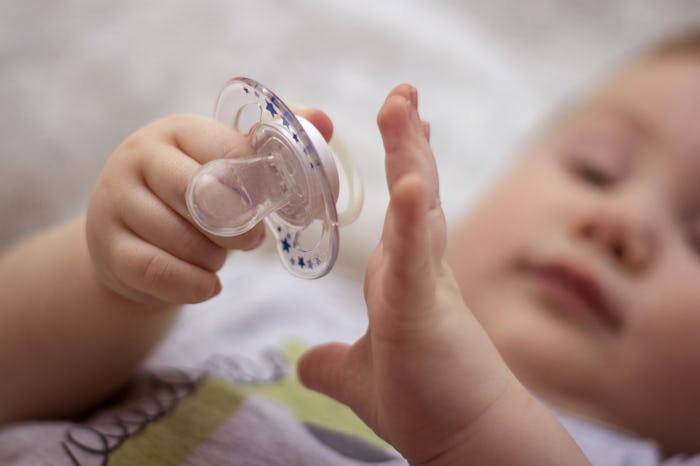Life

Here's When Your Baby Actually Needs To Stop Using The Pacifier, According To Science
While some babies never quite take to the idea of a pacifier, others consider the humble "binkie" to be nothing short of a best friend. From bedtime to car rides to the infamous witching hour, there are countless situations in which a pacifier can be a parent's best friend, too. But all good things must come to an end. So, when should a baby stop using a pacifier?Every baby is different, to be sure, but experts have a few suggestions all parents should consider.
If you're the parent of an older baby or toddler who's still passionate about his or her pacifier, you've no doubt received plenty of (likely unsolicited) opinions on this topic from a multitude of family members, friends, and complete strangers. (Irritatingly, said opinions were probably of the "aren't they getting too big for that thing?" variety.) And even though most of these comments are based on personal bias or rooted in old wives' tales, they're still bound to get under skin and make you wonder if you really are doing your child harm by enabling their pacifier habit.
The good news is, though, is that there actually isn't a tremendous amount of scientific data out there to back up the idea that using a pacifier past infancy will damage your kid for life. There are some concerns, however, and one group of experts that recommends a definite cut-off date — pediatric dentists.
"From a dental-health perspective, it's best to limit the pacifier when a child is 2 and stop it entirely by the time a child is 4," John Stritikus, DDS, a pediatric dentist in Dickson, Tennessee, tells Parents. After the age of 4, Stritikus explained, pacifiers can lead to an overbite, open bite, or crossbite (issues that can cause difficulties with chewing, appearance, and speech). Oftentimes, orthodontics are required to correct the problems. This advice is in line with the American Dental Association's recommendations, which state that, "If a child does not stop on his or her own, parents should discourage the habit after age 4 years. However, excessive pressure to stop can do more harm than good." So if it makes you feel any better, even the ADA understands how hard this habit can be to break.
On the bright side, giving your child a pacifier while they're still an infant won't harm their teeth. In fact, Stritikus added, using pacifiers during babyhood can even help to decrease cavities, because babies don't need to satisfy their need to suck with a bottle or breast when they're not actually hungry. Phew! A silver lining at last!
Dental health aside, are there any other concerns related to kids using pacifiers for an extended period of time? While some experts warn that this practice can lead to speech delays, there's conflicting data on the topic. For example, a 2008 study in the Contemporary Issues in Communication Science and Disorders "did not show a statistically significant relationship between prolonged pacifier use and speech articulation," according to the American Speech-Language-Hearing Association. But a 2015 study published in the Proceedings of the National Academy of Sciences suggested that giving pacifiers to babies as young as 6 months can slow their ability to talk, as The Telegraph reported. That's because "infants need free tongue movement to decipher speech sounds," researchers explained.
Still another study conducted in collaboration with the University of Washington and published in the journal BMC Pediatrics in 2009 found that children who sucked their fingers or who used a pacifier for over three years were three times more likely to develop speech impediments (according to a statement from the university).
Confusing, right? And speech delays aren't even the end of potential pacifier-related problems, as still more researchers discovered. Experiments conducted by psychologists from the University of Wisconsin-Madison and published by the journal Basic and Applied Social Psychology found that "pacifiers may stunt the emotional development of baby boys by robbing them of the opportunity to try on facial expressions during infancy" and that 6 -and 7-year-old boys who used pacifiers more as young children were "less likely to mimic the emotional expressions of faces" they watched on a video. Oddly, as noted by lead study author Paula Niedenthal, “There’s no effect of pacifier use on these outcomes for girls, and there’s a detriment for boys with length of pacifier use even outside of any anxiety or attachment issues that may affect emotional development.” Researchers aren't sure why this is, though one theory is that girls mature emotionally before and/or despite pacifier use.
Which study is correct? Or are they all correct on some level because kids are individuals and no answer is one-size-fits-all? For better or worse, sometimes science doesn't give clear cut advice, and this appears to be one of those times. Still, while some pediatricians might tell you that age 1 or 2 is the absolute limit, it would appear as though the most tangible negative results (the dental stuff, mainly) happen to kids who use pacifiers past the age of 4. As ever, the best course of action to take is probably to talk to your pediatrician about the issue, who knows your child and can tell you if any problems appear to be manifesting. And know that if your kid still thinks of his pacifier as his BFF well into toddlerhood, you're definitely not alone!
Check out Romper's new video series, Bearing The Motherload, where disagreeing parents from different sides of an issue sit down with a mediator and talk about how to support (and not judge) each other’s parenting perspectives. New episodes air Mondays on Facebook.